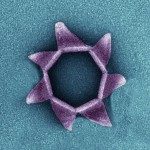Lien vers Pubmed [PMID] – 20551688
Intervirology 2010;53(5):362-78
The current paradigm on the nature of viruses is based on early work of the ‘phage group’ (the pro-phage concept) and molecular biologists working on tumour viruses (the proto-oncogene concept). It posits that viruses evolved from either prokaryotic or eukaryotic cellular genes that became infectious via their association with capsid genes. In this view, after their emergence viruses continued to evolve by stealing cellular genes (the escape model). This paradigm has been challenged recently by scientists who propose that viruses pre-dated modern cells. In particular, the discovery of Mimivirus has stimulated a lot of discussions on the nature of viruses. There are two major schools of thought, those who defend the escape model, suggesting that giant viruses are giant pickpockets (chimera), and those who emphasize their uniqueness and ancient origin. Comparative genomics of Mimivirus and related viruses (nucleo-cytoplasmic large DNA viruses) have produced a lot of data that have been interpreted according to the prejudices of the authors and thus failed until now to generate a consensus. I briefly review here the history of these debates and how they lead to new proposals, such as the definition of viruses as capsid-encoding organisms or else the recognition of their fundamentally cellular nature, the virocell concept.

